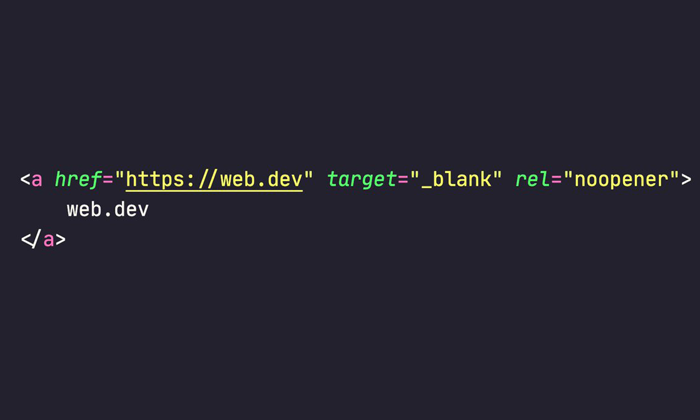“Noreferrer Noopener” HTML attributes can be added to outgoing hyperlinks. These tags can be used to improve your SEO efforts.
This post will discuss the differences between noreferrer tag and noopener tag. I’ll also explain how they differ from the Nofollow tags and their impact on SEO.
Let’s begin with some definitions.
What is rel= “noreferrer?”
The rel= “noreferrer” tag is an HTML attribute that can be added as a link tag (). This tag prevents the target website from passing the referrer information by removing the URL header.
This means that Google Analytics traffic from links with the rel= “noreferrer” attribute will be categorized as Direct Traffic and not Referral.
This is HTML View:
rel=”noreferrer”>Link to Example.com
This is an example of how to understand it better:
Let’s suppose that you link from Website A to Website B using the “noreferrer” tag.
If website owner B looks at the ‘ACQUISITION” report in Google Analytics, traffic from Website A is visible under the section’ REFERRALS.
Traffic from links that do not have rel= “noreferrer” is referred to as referral traffic.
If you link from Website A and Website B using the “noreferrer” tag, all traffic from Website A and Website B will be displayed in Google Analytics as DIRECT traffic (and not as a referral).
The rel= “noreferrer,” which shows traffic from links, is called direct traffic.
When should you use rel=” noreferrer?”
If you don’t wish other websites to know you are linking, you can use the rel= “noreferrer” attribute to outgoing links. That’s the main reason that I can think about.
Absolutely do not Use the rel= “noreferrer” attribute for internal links. Maybe it can cause you problems with the Google Analytics reports.
rel=”noreferrer”, and SEO
The noreferrer tag is not an impactful addition to your links.SEO is safe to use. you could use it safely without any worries.
However, it can have indirect effects on your promotion and link-building efforts. The reason is the below:
Linking to other webmasters can be a great way to attract their attention. Every webmaster should check their Google Analytics daily, and in particular the ‘Referral traffic.
They will share a website’s traffic on social media and follow the author.
This is a good SEO tip. In fact, Google recommends it as a valid method to obtain links from other websites (see below for the relevant quote from Google).
Google Advice: How to Attract New Links
The noreferrer tag can be attached to all links. This is because traffic from your site will not appear as a ‘Referral” in Google analytics. Other webmasters won’t know you have linked to them.
You may be thinking: Why bother talking about it? I won’t add it to my hyperlinks, and that’s the end.
This issue is popular because WordPress automatically adds the “noreferrer” tag to any outgoing links set to open in a “new tab.”
Noreferrer & WordPress
If you’re using WordPress, you’ll know that WordPress automatically adds rel= “noopener notreferrer” when adding external links to your content.
This was done to increase the security of WordPress rich editor TinyMCE and prevent unauthorized access. tab napping Other phishing attacks
Here’s an example:
rel=”noopener Noreferrer”>my external link
This will prevent any information from being passed to the new tab. The result is that traffic from your website to the linked website (by clicking on the link) will not be displayed in Google Analytics.
How to delete rel= “noreferrer” from WordPress links
You could prevent WordPress from automatically adding the attribute to external URLs, you should not open the links in new tabs. To put it another way, Links must be opened in the same window.
This is the easiest way to solve the problem, but users who click the external link will leave your site. This could increase bounce rates, decrease time on your site, and so forth.
However, mobile traffic makes up the majority of traffic to your site. Users will not be able to return to their previous window due to the new tab on mobile.
WordPress can be prevented from adding rel= “noreferrer” to external links, but these plugins only work when WordPress uses TinyMCE. The new editor is not (Gutenberg).
I recommend not messing with this. Just avoid opening external links within a new tab, and you will be fine.
Noreferrer and affiliate links
Noreferrer does not have an impact on affiliate links. This is because most affiliate programs don’t rely on referral traffic to award conversions but rather on the affiliate ID embedded in the link. Here’s an example:
You have nothing to be worried about.
Here is the difference between Nofollow and Noreferrer?
You add rel= “nofollow” to an external URL to instruct search engines not to pass any PageRank between pages. You tell search engines to ignore the link for SEO purposes.
The difference between Nofollow Noreferrer means that noreferrer doesn’t pass any referral information on to the browser, but the link is still followed. Nofollow means that referral information is sent to the browser, but the link is not followed.
They are different things. If you don’t trust a link, use Nofollow and “noreferrer.”
What is rel= “noopener?”
The HTML attribute that you can be added to external links is rel= “noopener.” It blocks the opening page from gaining any access to the original page.
Here’s an example of a rel= “noopener” tag-linked link:
rel=”noopener”>Link to Example.com
WordPress automatically adds this to external links that open in new tabs for security reasons. It is highly recommended that you keep it.
It is recommended that you add rel= “noopener” if you don’t have WordPress installed. This will allow external links to open in a new tab.
Rel=”noopener”, and SEO
Also Noopener has no impact on your SEO, so you can use it safely to increase the security of your site.
Key Learnings
Many people find dealing with HTML tags and attribute confusing. However, this shouldn’t be so with “noreferrer” or “noopener.”
They have no negative impact on your SEO. Use them all!
These tags will be added automatically if you’re on WordPress.
To enhance your website’s security and prevent other websites (through the browser session) from accessing your page, the “noopener” is required.
Noreferrer protects your referral information from being sent to the target site. This also hides referral traffic in Google Analytics.
Do not open any external links in new tabs if you do not want other websites to view traffic from your site as ‘Referral traffic. WordPress will not automatically add the attributes to links. Everything is fine.
Nofollow is not synonymous with “noreferrer.” Search engines are instructed not to use a link if it has rel= “nofollow” added to it. Noreferrer does not pass link juice between websites.
Let me know if you have any questions about rel= “noreferrer, noopener” and its role.




